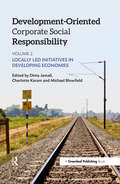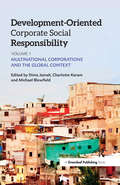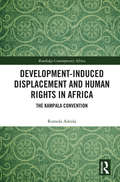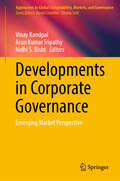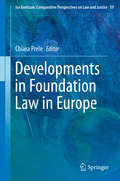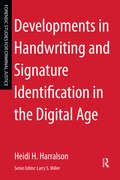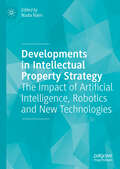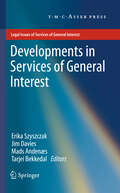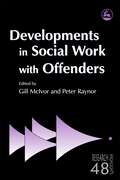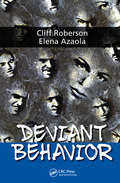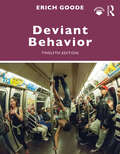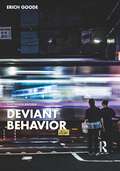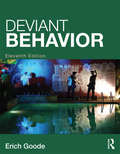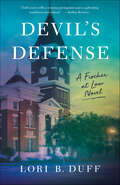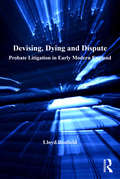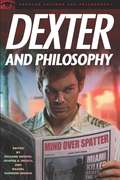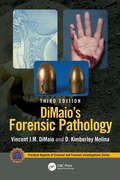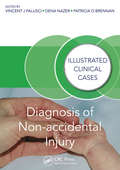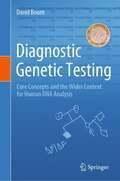- Table View
- List View
Development-Oriented Corporate Social Responsibility: Locally Led Initiatives in Developing Economies
by Dima Jamali Charlotte Karam Michael BlowfieldThis volume provides a platform for localized perspectives on CSR in developing countries across the globe. The chapters bring local context and business to the forefront and highlight the efforts spearheaded by indigenous actors from within the developing world. They present insights from developing countries through successful and less successful examples of locally-led CSR efforts. Together, these perspectives capture the complex paradoxes of CSR in developing countries and highlight common features in national institutions across the developing world, such as weak political and regulatory institutions, that shape local CSR initiatives and often limit its developmental impact.The editors argue the need to embrace partnership models that leverage the strengths of different actors to promote effective development and tackle the complex challenges facing the developing world. This important series will be the reference source for academics, practitioners, policy-makers and NGOs involved in development-oriented CSR.
Development-Oriented Corporate Social Responsibility: Multinational Corporations and the Global Context
by Dima Jamali Charlotte Karam Michael BlowfieldGlobalization and the professionalization of Corporate Social Responsibility (CSR) have led to a surge of CSR activities claiming to support development across the globe. In this two volume series, the chapters explore this claim through nuanced debate about the potentialities, limitations and threats of development-oriented CSR in the developing world at both the global and local levels. Volume 1 explores whether there is a genuine possibility for corporations to contribute to development through CSR activities. With corporate reach spreading into every corner of the globe, this is a timely contribution presenting cases from developing countries spanning multiple continents. It explores the multi-level and multi-stakeholder dynamics involved in shaping the complex interface between multinational corporations (MNCs) and possibilities for CSR-related development. The chapters highlight the potential for MNCs to spread best practice and complement the role of governments in bridging governance gaps and spearheading capacity building efforts. But they also highlights serious reservations, stemming from isolated assessments, limited appreciation of the complexities of context, and the permeation of a northern agenda that marginalizes local voices.Within the larger debate on the merits and evils of globalization, this volume captures the mixed record of MNCs in promoting effective development in those parts of the world where it is most needed. This important series will be the reference source for academics, practitioners, policy-makers and NGOs involved in development-oriented CSR.
Development-induced Displacement and Human Rights in Africa: The Kampala Convention (Routledge Contemporary Africa)
by Romola AdeolaWithin the context of the 2009 Kampala Convention, this book examines how a balance can be struck between the imperative of development projects and the rights of persons likely to be displaced in Africa. Following independence, many African states embarked on large-scale development projects such as dams, urban renewal and extraction of natural resources and have had to grapple with how to protect displaced communities while implementing development projects. These projects were considered a panacea for Africa’s development and the economic interests of the majority were often considered over and above the interests of the minority of people who were displaced by these projects .This book examines how a balance can be struck between the imperative of development and the rights of displaced persons within the context of the African Union Convention on the Protection and Assistance of Internally Displaced Persons in Africa (the Kampala Convention). Romola Adeola analyses the obligations that are placed on African states by the Kampala Convention in the context of development-induced displacement. This book will be of interest to scholars of human rights law, forced migration, African Studies and development.
Developments in Corporate Governance: Emerging Market Perspective (Approaches to Global Sustainability, Markets, and Governance)
by Arun Kumar Tripathy Vinay Kandpal Nidhi S. BishtThis book explores the dynamic landscape of corporate governance, focusing on the perspective of emerging markets. It delves into the evolving governance frameworks of these markets, highlighting variations in board structures, CEO roles, and director compositions due to diverse traditions and cultures. Emerging markets differ significantly from developed markets, characterized by concentrated ownership and the prevalence of family business groups within weak property rights environments. Additionally, there is a notable tension between direct ownership and control rights in these markets. The book's relevance is underscored by the growing importance of emerging markets in the global economy. These markets have contributed significantly to global output and growth, rapidly integrating into global trade and finance networks. Advocating for a dynamic view of corporate governance, the book emphasizes the need for continuous evaluation and adaptation of governance practices. It covers contemporary governance topics such as the role of whistle-blowers, governance challenges in start-ups, governance practices in family firms, and evolving governance regulations in emerging economies. This diverse coverage deepens readers' understanding of developments in governance issues, particularly within emerging economies.
Developments in Foundation Law in Europe
by Chiara PreleThis book deals with foundation law in various European countries. It sums up contributions from the most outstanding experts in foundation law in fourteen countries. These are either civil law or common law, and their socio-economical situation is considerably different. Despite the outstanding differences in each country, foundations have been growing in number and importance all over Europe in the last decades. Political, economical and social changes occurred in various European countries increased foundations' role. The need to focus on foundations' laws and regulations arose in many States for different reasons. The contributions in this book focus in particular on the recent development of foundation law, on the evolution foundations have undergone in recent years and on trends in law.
Developments in Handwriting and Signature Identification in the Digital Age
by Heidi H. HarralsonThe examination of handwriting and signatures has a long and established history as a forensic discipline. With the advancement of technology in the use of digital tablets for signature capture, changes in handwriting examination are necessary. Other changes in handwriting, such as in increase in printed writing styles and the decrease in handwriting training in schools necessitates a re-examination of forensic handwriting identification problems. This text takes a fresh and modern look at handwriting examination as it pertains to forensic, legal, and criminal justice applications.
Developments in Intellectual Property Strategy: The Impact of Artificial Intelligence, Robotics and New Technologies
by Nadia NaimResearch in the area of intellectual property (IP) is increasingly relevant to the rapidly growing artificial intelligence (AI) and robotics industries, affecting the legal, business, manufacturing, and healthcare sectors. This contributed volume aims to develop our understanding of the legal and ethical challenges posed by artificial intelligence and robotics technologies and the appropriate intellectual property based legal and regulatory responses. It provides a philosophical and legal framework for considering concepts and principles that relate to the development and use of such technologies at the international, regional, and national levels. The legal discourse in IP concerns the ever-growing AI sector and how businesses can protect their IP and incorporate AI. Moral sentiments often take a back seat to market sentiments, even in shaping the direction of ethical business strategy. This anomaly persists despite growing interest in ethics and IP. Taking an interdisciplinary and diverse perspective, this book enriches the evolving definition and scope of IP literature by focusing on actors, products and regulation that shape the business sector. Considering the gap between theory and practice, this book bridges academic and professional knowledge in unpacking legal, ethical and governance issues in the intellectual property industry. In an effort to include as many viewpoints as possible, contributions have been gathered from diverse fields, including business, ethics, governance, law, philosophy and technology studies. This book will appeal to academics in the field of intellectual property, business ethics, AI, emerging technologies and strategic innovation, as well as practitioners and policy makers.
Developments in Services of General Interest
by Erika Szyszczak Jim Davies Tarjei Bekkedal Mads AndenæsThis is the third book in the series Legal Issues of Services of General Interest. The book focuses upon a set of research questions on the recent developments in the emergence of services of general interest (SGIs) as a distinct EU concept. This includes, inter alia, the emergence of universal service obligations and the way they are regulated in the EU in primary and secondary law, the range of soft law communications adopted by the Commission to create a distinctive EU concept of SGIs, the residual role of hard law in the Treaty on the Functioning of the European Union (TFEU), the special problems created by Social Services of General Economic Interest and the interaction of procurement and state aid law with SGIs. A new perspective is offered in this book: some of the issues faced by the EU in accommodating SGIs into a regulatory framework are found also in the policy of the WTO and in least developed countries (LDCs).
Developments in Social Work with Offenders
by Gwen Robinson Fergus Mcneill Barry Goldson Tim Chapman James Bonta Iain Crow Gill Mcivor Loraine Gelsthorpe Shadd Maruna Frank Porporino Chris Trotter Sue Rex Sam Lewis James Mcguire Steve Wormith David O'Mahony Peter Raynor Bill Whyte Maurice Vanstone David O ''MahonyDevelopments in Social Work with Offenders explains the organisational and legislative changes that have occurred in social work and probation across the UK in the past 10 years, in the context of the accumulating body of knowledge about what constitutes effective practice in the assessment, supervision and management of offenders in the community. Three different aspects of working with offenders are covered: developments in policy; assessment, supervision and intervention; and issues and needs. Contributions from experts in the field discuss issues such as community `punishment', case management, accreditation and resettlement. The continuing concern with promoting evidence-based solutions to crime is addressed, and this book will assist professionals working with offenders with making focused interventions supported by research. This book will be essential reading for students of social work and probation and criminology, probation officers and social workers.
Deviant Behavior
by Cliff Roberson Elena Azaola GarridoDeviant behavior is not a subject that you study in school and then file away. It is a study of life and is ever changing. Defining the concept of deviant behavior is one of the most difficult tasks to overcome when studying the subject. Sociologists probably disagree more over the meaning of deviant behavior than any other subject. Deviant Behavio
Deviant Behavior
by Erich GoodeDeviant Behavior offers an engaging and wide-ranging discussion of deviant behavior, beliefs, and conditions. It examines how the society defines, labels, and reacts to whatever, and whoever, falls under this stigmatizing process—thereby providing a distinctly sociological approach to the phenomenon. The central focus in defining what and who is deviant is the audience—members of the influential social collectivities that determine the outcome of this process. The discussion in this volume encompasses both the explanatory (or positivist) approach and the constructionist (or labeling) perspectives, thereby lending a broad and inclusive vista on deviance. The central chapters in the book explore specific instances or forms of deviance, including crime, substance abuse, and mental disorder, all of which share the quality that they and their actors, believers, or bearers may be judged by these influential parties in a negative or derogatory fashion. And throughout Deviant Behavior, the author emphasizes that, to the sociologist, the term "deviant" is completely non-pejorative; no implication of inferiority or inherent stigma is implied; what the author emphasizes is that specific members of the society—social circles or collectivities—define and treat certain parties in a derogatory fashion; the sociologist does not share in this stigmatizing process but observes and describes it.
Deviant Behavior
by Erich GoodeThe new 2022 edition of the most widely taught deviance text brings us into a changing political era. A new chapter on political deviance includes a section that defines political deviance, emphasizing a sociological and not an ideological definition. It also covers which sectors of the society define what constitutes political deviance; and political deviance and its relation to social change. In addition, the chapter on substance abuse provides more discussion of marijuana legalization and decriminalization. Although disease as potential deviance has been covered, the COVID-19 pandemic greatly expands discussions on this topic. Updated throughout, this new edition includes expanded coverage of Black Lives Matter, sexual harassment, the social construction of immigration, and other topics. A new section on logic, reasoning, and verification of facts is an important new feature for student critical thinking while it addresses the recent politics of truth and lying, including QAnon.
Deviant Behavior (Mysearchlab Series 15% Off Ser.)
by Erich GoodeDeviant Behavior provides a comprehensive study of the behavior, beliefs, conditions, and reactions to deviance, giving students a better understanding of this phenomenon. Deviance is discussed from the sociological perspectives of positivism and constructionism. Readers will grasp the reason behind deviant behavior through the positivist perspective and why certain actions, beliefs, and physical characteristics are condemned through the constructionist perspective. New to this edition: Two chapters on crime make clearer distinctions between criminalization of behavior, vs. criminal behavior itself More discussion of the relativity of deviance, including how murder is socially and legally constructed Expands the notion that conspiracy theory is a form of cognitive deviance New discussion furthers the difference between labeling theory and constructionism New Section on environmental pollution with reference to "green criminology" New section added on Deviance and Harm Newsworthy new features include: A Formerly Homeless Man Speaks Out Victimization and Abuse Mass Incarceration Stop and Frisk Missing Black Men? (with implications for families and demography) Arrest-Incarceration Gap Disparities in Sentencing The End of the Crime Decline? The Brother of a Murder Victim Speaks Out A Tattoo Collector Gets Inked Faculty-Student Sex Reflections on Studying BDSM
Devil in the Details: Scenes from an Obsessive Girlhood
by Jennifer TraigThe author gives a humorous account of her battles with obsessive-compulsive disorder while growing up.
Devil's Bridge (Alexandra Cooper #17)
by Linda FairsteinThe Manhattan waterfront is one of New York City's most magnificent vistas, boasting both the majestic Statue of Liberty and the busy George Washington Bridge. But Detective Mike Chapman is about to become far too well acquainted with the dangerous side of the Hudson river and its islands when he takes on his most personal case yet: the disappearance of Alex Cooper.Coop is missing - but there are so many leads and terrifying complications: scores of enemies she has made after a decade of putting criminals behind bars; a recent security breach with dangerous repercussions; and a new intimacy in her relationship with Mike, causing the Police Commissioner himself to be wary of the methods Mike will use to get Coop back... if he can.
Devil's Defense: A Fischer at Law Novel
by Lori B. DuffA gripping courtroom drama that explores the struggle between morality vs. professional obligation, Devil’s Defense will appeal to fans of female-lead courtroom dramas like The Good Wife.Jessica Fischer wants nothing more than to build her law practice in small-town Ashton, Georgia. She’s well on her way when the local town hero, football coach Frank “Tripp” Wishingham III, hires her to represent him in a paternity suit. Coach is everything Jessica despises—arrogant, sexist, entitled—but it’s her job to make him look good in public. This is made doubly difficult when her burgeoning relationship with a local reporter gets in the way of telling the truth. Are things as black and white as Jessica thinks? And can she find a way to succeed without compromising her own personal values—or her personal life?
Devil's Knot: The True Story of the West Memphis Three
by Mara Leveritt*SOON TO BE A MAJOR MOTION PICTURE STARRING REESE WITHERSPOON AND COLIN FIRTH * The West Memphis Three. Accused, convicted...and set free. Do you know their story?In 2011, one of the greatest miscarriages of justice in American legal history was set right when Damien Echols, Jason Baldwin, and Jessie Misskelley were released after eighteen years in prison. Award-winning journalist Mara Leveritt's The Devil's Knot remains the most comprehensive, insightful reporting ever done on the investigation, trials, and convictions of three teenage boys who became known as the West Memphis Three. For weeks in 1993, after the murders of three eight-year-old boys, police in West Memphis, Arkansas seemed stymied. Then suddenly, detectives charged three teenagers--alleged members of a satanic cult--with the killings. Despite the witch-hunt atmosphere of the trials, and a case which included stunning investigative blunders, a confession riddled with errors, and an absence of physical evidence linking any of the accused to the crime, the teenagers were convicted. Jurors sentenced Jason Baldwin and Jessie Misskelley to life in prison and Damien Echols, the accused ringleader, to death. The guilty verdicts were popular in their home state--even upheld on appeal--and all three remained in prison until their unprecedented release in August 2011.With close-up views of its key participants, this award-winning account unravels the many tangled knots of this endlessly shocking case, one which will shape the American legal landscape for years to come.
Devil's Wind
by Patricia WentworthA thrilling tale of love, adventure, and survival during the Indian Mutiny of 1857 by the creator of the iconic Miss Silver Helen Wilmot, a resourceful and loyal young woman, journeys to India to live with her widower father and Adela Lauriston, her ravishing yet headstrong cousin. When Helen's father dies, she moves in with Adela and her husband, the dashing Captain Richard Morton. Adela's flirtatious behavior and imperious attitude set tongues wagging in the expatriate community, but when the spirit of rebellion spreads like wildfire amongst the sepoys of the East India Company, the time for gossip is over. Fleeing the massacre at Cawnpore, Helen, Adela, and Captain Morton discover that the sins of yesterday are never forgotten, and that true love can blossom in even the most tragic of circumstances. This ebook has been professionally proofread to ensure accuracy and readability on all devices.
Devising, Dying and Dispute: Probate Litigation in Early Modern England
by Lloyd BonfieldSeventeenth-century England was a country obsessed with property rights. For only those who owned property were considered to have a vested interest in the maintenance of law, order and social harmony. As such, establishing the ownership of 'things' was a constant concern for all people, and nowhere is this more evident than in the cases of disputed wills. Based on a wealth of surviving evidence from the Prerogative Court of Canterbury, the probate jurisdiction which probated wills of the more wealthy English property owners as well as some of those with a more modest quantity of property, this book investigates what litigation over the validity of wills reveals about the interplay between society and law. The volume investigates, catalogs, and systematizes the legal issues that were raised in will disputes in the Canterbury Court in the last half of the seventeenth century. However, this is not just a book about law and legal practice. The records from which it draws plunge us into deeply personal and often tragic situations, revealing how the last requests of the dead and dying were often ignored or misinterpreted by family, friends and creditors for their own benefit. By focusing on property law as reflected in cases of disputed wills, the book provides a glimpse at a much fuller spectrum of society than is often the case. Even people of relatively modest means were concerned to pass on their possessions, and their cases provide a snapshot of the type of objects owned and social relationships revealed by patterns of bequests. This too is true for women, who despite being denied full participation in many areas of civic life, are frequently encountered as key players in court cases over disputed wills. What emerges from this study is a picture of a society for which notions of law and private property were increasingly intertwined, yet in which courts were less concerned with formality than with ensuring that the intentions of will-makers were properly carried out.
Dewigged, Bothered, and Bewildered
by John MclarenThroughout the British colonies in the nineteenth century, judges were expected not only to administer law and justice, but also to play a significant role within the governance of their jurisdictions. British authorities were consequently concerned about judges' loyalty to the Crown, and on occasion removed or suspended those who were found politically subversive or personally difficult. Even reasonable and well balanced judges were sometimes threatened with removal.Using the career histories of judges who challenged the system, Dewigged, Bothered, and Bewildered illuminates issues of judicial tenure, accountability, and independence throughout the British Empire. John McLaren closely examines cases of judges across a wide geographic spectrum -- from Australia to the Caribbean, and from Canada to Sierra Leone -- who faced disciplinary action. These riveting stories provide helpful insights into the tenuous position of the colonial judiciary and the precarious state of politics in a variety of British colonies.
Dexter and Philosophy
by Richard Greene Rachel Robison George A. ReischWhat explains the huge popular following for Dexter, currently the most-watched show on cable, which sympathetically depicts a serial killer driven by a cruel compulsion to brutally slay one victim after another? Although Dexter Morgan kills only killers, he is not a vigilante animated by a sense of justice but a charming psychopath animated by a lust to kill, ritualistically and bloodily. However his gory appetite is controlled by "Harry's Code," which limits his victims to those who have gotten away with murder, and his job as a blood spatter expert for the Miami police department gives him the inside track on just who those legitimate targets may be. In Dexter and Philosophy, an elite team of philosophers don their rubber gloves and put Dexter's deeds under the microscope. Since Dexter is driven to ritual murder by his "Dark Passenger," can he be blamed for killing, especially as he only murders other murderers? Does Dexter fit the profile of the familiar fictional type of the superhero? What part does luck play in making Dexter who he is? How and why are horror and disgust turned into aesthetic pleasure for the TV viewer? How essential is Dexter's emotional coldness to his lust for slicing people up? Are Dexter's lies and deceptions any worse than the lies and deceptions of the non-criminals around him? Why does Dexter long to be a normal human being and why can't he accomplish this apparently simple goal?
DiMaio's Forensic Pathology (Practical Aspects of Criminal and Forensic Investigations)
by Vincent J.M. DiMaio D. Kimberley MolinaThe first two editions of Forensic Pathology have been highly touted as the definitive, go-to text reference on forensic pathology and this latest edition is no exception. DiMaio’s Forensic Pathology, Third Edition is fully updated to include the many advancements that have occurred in the field over the last 20 years since the last edition was published. Joining Dr. Vincent DiMaio is practicing forensic pathologist Dr. Kimberley Molina who brings her expertise to the latest edition of this all-time best-selling work. Historical chapters have been reviewed and updated, and the natural disease and toxicology chapters have been streamlined, so as to expand on the new improvements in the field. New content includes discussions on chronic traumatic encephalopathy, sudden unexplained infant deaths, deaths in the elderly and blast injuries – among other topics. Chapters incorporate changes to death investigation, forensic DNA typing and other relevant fields relative to forensic pathology and determination of death. In addition, the third edition includes an entirely new – and long-sought-after – chapter summarizing Dr. DiMaio’s world-renowned expertise on gunshot wounds. Key Features Includes over 400 full-color images illustrating key concepts Boasts new chapters on gunshot wounds, mass fatality incidents and the application of forensic science principles to forensic pathology practice Provides updated and expanded coverage of medicolegal death investigation, postmortem changes, time of death, deaths in custody, deaths in the elderly and drug-related deaths Presents new research and advanced techniques, ranging from chronic traumatic encephalopathy to new and emerging drugs DiMaio’s Forensic Pathology, Third Edition maintains its concise, easy-to-read format with completely updated references and over 400 full-color demonstrative photographs and photomicrographs to illustrate concepts – making it appealing not only to forensic pathologists, but also law enforcement personnel and attorneys. This highly anticipated work continues Dr. DiMaio’s long legacy of producing invaluable educational and professional resources.
Diagnosis of Non-accidental Injury: Illustrated Clinical Cases (Illustrated Clinical Cases Ser.)
by Patricia Brennan Vincent J. Palusci Dena NazerRecognition and diagnosis of child abuse and neglect creates an important foundation for the protection of children. Physicians and other healthcare providers have a fundamental role in this process, and need to be confident that they can identify correctly the signs and symptoms that provide clues to non-accidental injuries resulting from child ma
Diagnostic Genetic Testing: Core Concepts and the Wider Context for Human DNA Analysis
by David BournOver the last decade, technical advances have allowed genomic testing which provides a great opportunity for diagnosis but also an increased chance of uncertain or unexpected findings. This book addresses many of the questions that arise in this context and summarizes the essential concepts in diagnostic genetic testing in an easy-to-read manner. It also covers some broad context for the practical and ethical implications of examining human DNA sequences. The book starts with a general introduction to the field, providing enough background to allow readers without any previous education in genetics to comprehend the material in the subsequent chapters. The main part explores differing aspects of human genetics and the wider implications of testing in these areas. The author covers not only single gene inheritance, but also genetic testing of cancers and how testing benefits the patients. Special emphasis is also given to the questions of genetics and identity. The concluding part then draws the main themes together and summarises the wider significance of genetics. It also explores the gap between promises made for the impact of advances in genetics, and the actual benefits to patients. The book is written for everyone interested to learn about the process of genetic testing and the broader implications. Moreover, it is aimed at health professionals with an interest in genetics, at students or scientific trainees looking for an introduction to diagnostic genetics, and at professionals in health policy or health journalism.
Diagnostik im Strafvollzug: Eine praxisorientierte Einführung (Basiswissen Soziale Arbeit #7)
by Stefanie Schmidt Silvia Sibyll HawliczekDas Lehrbuch ist eine praxisnahe Einführung in das Arbeitsfeld und die methodischen Herangehensweisen der Diagnostik im Strafvollzug. Es richtet sich zuvorderst an Psychologinnen und Psychologen sowie Sozialarbeiterinnen und Sozialarbeiter, die im Rahmen ihrer Tätigkeit im Justizvollzug mit diagnostischen Einschätzungen betraut sind sowie Studierende dieser Fächer. Nach einer Einführung in die Aufgaben und Rahmenbedingungen, die Diagnostik im Strafvollzug berühren, werden zwei verschiedene Modelle zur Rehabilitation straffälliger Personen (Risk-Need-Responsivity und Good Lives Model) vorgestellt, die der Diagnostik im Strafvollzug einen theoretischen Rahmen geben. Daran anknüpfend führt das Lehrbuch in unterschiedliche Methoden ein, welche den diagnostischen Urteilsprozess strukturieren. Diese Grundlagen münden schließlich in ein stärker praxisorientiertes Kapitel, in dem der Prozess der Urteilsbildung anhand zahlreicher Beispiele schrittweise vorgestellt wird.
